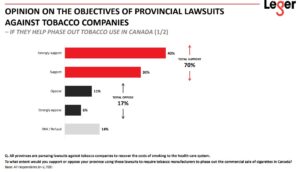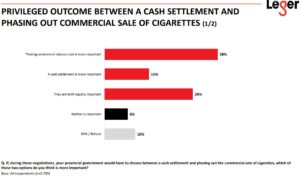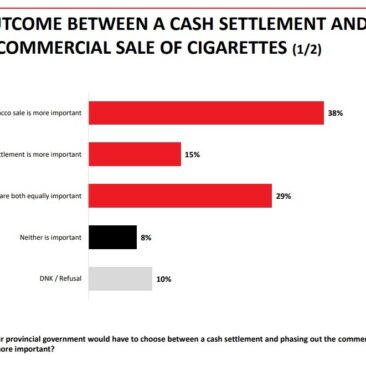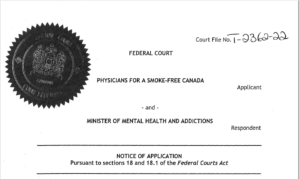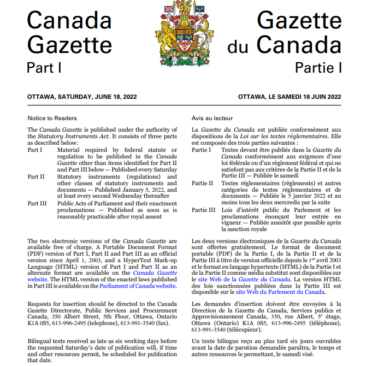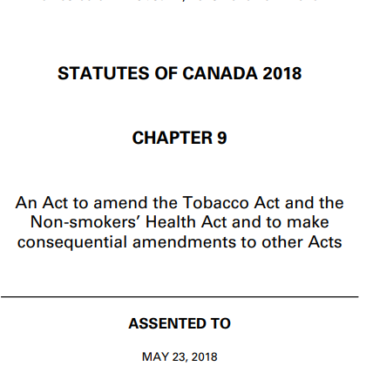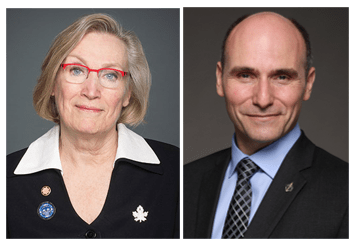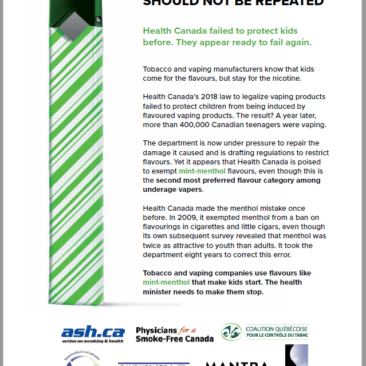Ottawa, Montreal, Edmonton, September 26, 2023 – A new Leger poll finds that there is strong public support (70%) for provinces to use their lawsuits against tobacco companies to mandate a phase out of the commercial sale of cigarettes in Canada. The survey was conducted from August 30 to September 9 among 2,709 Canadians. The results are being released in advance of Wednesday’s (10h30) court hearing to consider the industry’s 11th request to prolong their reprieve from lawsuits, bringing the suspension on lawsuits to five years.
Support for a phase-out is broad across all provinces, including those who are relying on legal consortia working on a contingency basis for provincial governments (Atlantic provinces, 74% support; Manitoba/Saskatchewan, 65%; Alberta, 64%; British-Columbia, 72%). The results also show that when choosing between a phase-out and a cash settlement, many more Canadians (38%) would support a phase-out over a cash settlement (15%).
“As far as we can tell, the central approach of the provinces in these lawsuits is to aim for a financial settlement and not to ensure they result in an end to the harm that has forced these companies into insolvency.” explained Cynthia Callard, Executive Director of Physicians for a Smoke-free Canada. “These polling numbers show that a short-sighted focus on increasing government revenues is not the preferred outcome of the two-thirds of Canadians (67%), who recognize that the outcome of these lawsuits should include game-changing measures aimed at getting rid of the tobacco problem.” Thirty-eight percent of respondents say they think phasing out tobacco sales is more important than a cash settlement and 29% find it equally important (only 15% find a cash settlement more important).
“These survey results show that Canadians understand that major reforms on this deadly industry are needed. The provincial lawsuits have effectively bankrupted the industry, and governments must now choose between allowing the insolvency proceedings to sustain the commercial tobacco trade or to force manufacturers to phase out tobacco sales.” said Flory Doucas, Codirector and spokesperson of the Quebec Coalition for Tobacco Control.
“Maintaining tobacco sales to generate revenue for the provinces is bad for public health and bad for the taxpayers, because continued smoking will inevitably lead to greater harm and greater costs to the health care system. An economic analysis shows the value of savings to the health care system by forcing changes on industry behaviour would greatly exceed the increased revenues from tobacco sales the provinces are hoping for.” The study found that Quebec would save $22.2 billion and Ontario $26.1 billion in health care and other disease-related costs if smoking prevalence was reduced to under 5% by 2035 instead of continuing at the current rate of decline. This reduction would be accompanied by 641,000 fewer smokers in Quebec and 990,000 fewer in Ontario, sparing at hundreds of thousands of Canadians from suffering and dying from tobacco-related disease.
“Tobacco companies should be held accountable for the harms they have caused, and provincial governments should be held accountable for allowing such harms to continue by agreeing to a “business as usual” approach. No settlement agreement should bank on the need to recruit future addicts which are mostly teenagers. There is no need to keep this unsustainable and harmful industry on life support”, said Les Hagen, Executive Director of Action on Smoking & Health (ASH Canada).
“These are historical negotiations and provinces have the upper hand while Big Tobacco’s back is to the wall. This is a unique opportunity to phase out cigarette sales, protect youth and public health and to secure huge saving in health care costs. We are asking provincial governments to be mindful of their responsibilities towards the public’s interest as they reconvene next week before the Ontario court and consider the path forward in dealing with their health-care recovery lawsuits against tobacco companies,” concludes Mr. Hagen.
Last week, tobacco control groups identified material filed with the insolvency court that indicates that negotiations between creditors and manufacturers have bogged down and that a conclusion is not in sight. They called on provinces to allow the claims of Quebec smoking victims to be resolved quickly, and to take a different tack to resolve their own cost-recovery lawsuits. The groups also want greater transparency from the provinces on their plans for the future of the tobacco industry, and an assurance that the outcomes of this suit will prevent future harms from tobacco use.
***
Léger Poll findings
Link to poll here
(Sample of 2,709 Canadians aged 18 and over, from August 30, 2023, to September 9, 2023):
Findings:
70% of Canadians support their “province using these lawsuits to require tobacco manufacturers to phase out the commercial sale of cigarettes in Canada.”
Among decided Canadians, 80% support a settlement aimed at phasing out cigarettes sales, versus 20% who oppose such an outcome (not counting 14% of undecided).
If provincial governments would have to choose between a cash settlement and ending commercial tobacco sales, the largest proportion of Canadians (38%) would prefer a phase-out (while 29% say they are equally important and only 15% say a cash is more important).
Three-quarters (74%) of decided respondents think obtaining a phase-out of commercial cigarette sales is as or more important than seeking money (not counting 10% of undecided)
